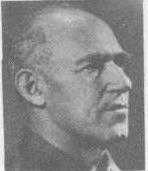Arieh Lubin
| Arieh (Leo) Lubin | |
|---|---|
 Photograph of Arieh (Leo) Lubin | |
| Born |
1897 U.S.A |
| Died |
1980 (aged 82–83) Tel Aviv, Israel |
| Nationality | Israeli |
| Field | Painting |
| Movement | Israeli art |
Arieh (Leo) Lubin (Hebrew: אריה לובין, born 1897, died 1980) was an Israeli artist.
Biography
_Lubin.jpg)
Photographer: Stanley I. Batkin
In 1915, Lubin studied in Chicago, but stopped studying to join the Jewish Brigade in World War I. Following the war, he studied in Europe, returning to Israel in 1922. In some of his works, Arieh Lubin reflects contemporary trends of the 1920s. His main influences were Paul Cézanne, Pablo Picasso, and Henri Matisse.[1] The Cubism of Derain, The Purism of Le Corbusier and Ozenfant- these and other influences he absorbed through the pages of "L'Esprit Nouveau" (the new spirit), a journal he ordered from Paris. In a country virtually isolated form the centers of culture and information, the striving of the Eretz Israel artists of the 1920s to draw on international sources was unique. He was one of the first Israeli artists to settle in the artists quarter of Safed.
Lubin died in Tel Aviv in 1980 and was buried in the Trumpeldor Cemetery.
Education
- 1915 Chicago
Awards and Prizes
- 1922 John Quincy Adams Prize for Study Abroad[2]
- 1956 Ramat Gan Panorama Prize
- 1957 Olympic Committee Prize for Sports Subjects
- 1957 Dizengoff Prize
- 1978 Worthy of Tel Aviv
References
As of this edit, this article uses content from "Artist List, Information Center for Israeli Art", which is licensed in a way that permits reuse under the Creative Commons Attribution-ShareAlike 3.0 Unported License, but not under the GFDL. All relevant terms must be followed.
- ↑ Still life with bottles at the Israel Museum shop
- ↑ "Arieh Lubin". Information Center for Israeli Art. Israel Museum. Retrieved November 2011.
External links
- Arieh Lubin collection at the Israel Museum. Retrieved February 2012
- "Arieh Lubin". Information Center for Israeli Art. Israel Museum. Retrieved February 2012.
- Art of Arieh Lubin at Europeana. Retrieved February 2012
- Arieh Lubin on Artfact.com